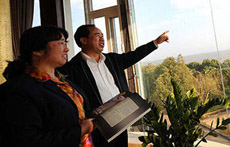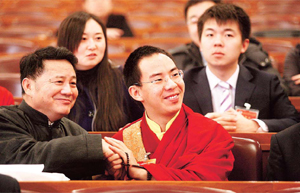Voice from Tokyo
(Chinadaily.com.cn)
Updated: 2010-03-01 13:47
Choice Monthly: High Expectations for "Beijing Consensus" March
China expanded investments and liberalized its financial policies to overcome the financial crisis, but now the world is focusing on when China will adopt a tighter policy, because to a great extent this will decide on the direction of the Chinese and even the world economy.
The "Washington Consensus" has faith in neo-liberalism, with emphasis on relaxing restrictions and promoting privatization. On the contrary, the "Beijing Consensus" initiates a market economy under the strong leadership of government. And this mode adopted by China is attracting attention from the world.
The current consumption fever, however, exposes the problems in the "China Model". Investments and loans largely flow into the state-owned enterprises, which control the leading industry and local governments, little to the private enterprises whose export is affected as well. Meanwhile, the recovery resulting from the asset bubble effect expands the wealth disparities as well.
In such a situation, Chinese leaders began anew to stress that energetic efforts should be made to develop new, high-tech and technology-intensive industries to replace the traditional processing and assembling industries; that the redistribution of social income must be promoted.
Nowadays, China has attained its goal to preserve an 8 percent increase of the GDP, and the government is preparing to restart the "Harmonious Society" blueprint aimed at narrowing the gap in wealth. If the Chinese government could burst the asset bubble and shift toward the harmonious track, no doubt that the international community will speak more highly of the "Beijing Consensus".
Japan times: A blueprint for China 10/03
Premier Wen Jiaobao described China's overall economic goals by saying, "This is a crucial year for the country to continue fighting against the global financial crisis while maintaining a steady and comparatively fast economic development and accelerating the transformation of economic growth pattern."
Pointing out the need for structural change, he called for better energy conservation especially in manufacturing, transport and construction, nurturing of new energy and new materials industries and bio-industry, support for medium-size and small enterprises, and development of financial, distribution and information services.
It is remarkable that Mr. Wen vowed to reform the income distribution system and to "resolutely reverse a widening income gap." He said that the government "will not only make the pie of social wealth bigger by developing the economy but also distribute it well on the basis of a rational income distribution system."


